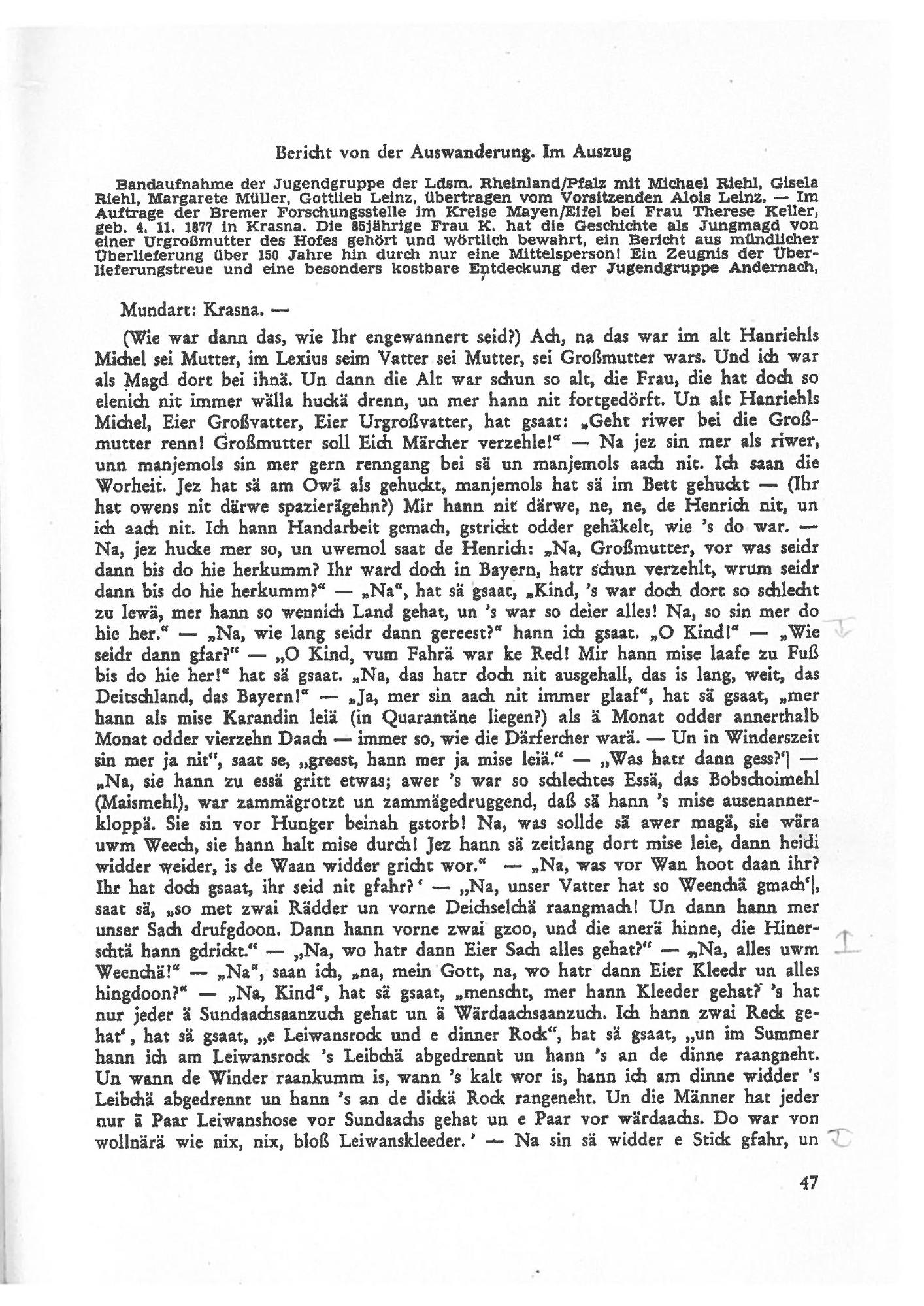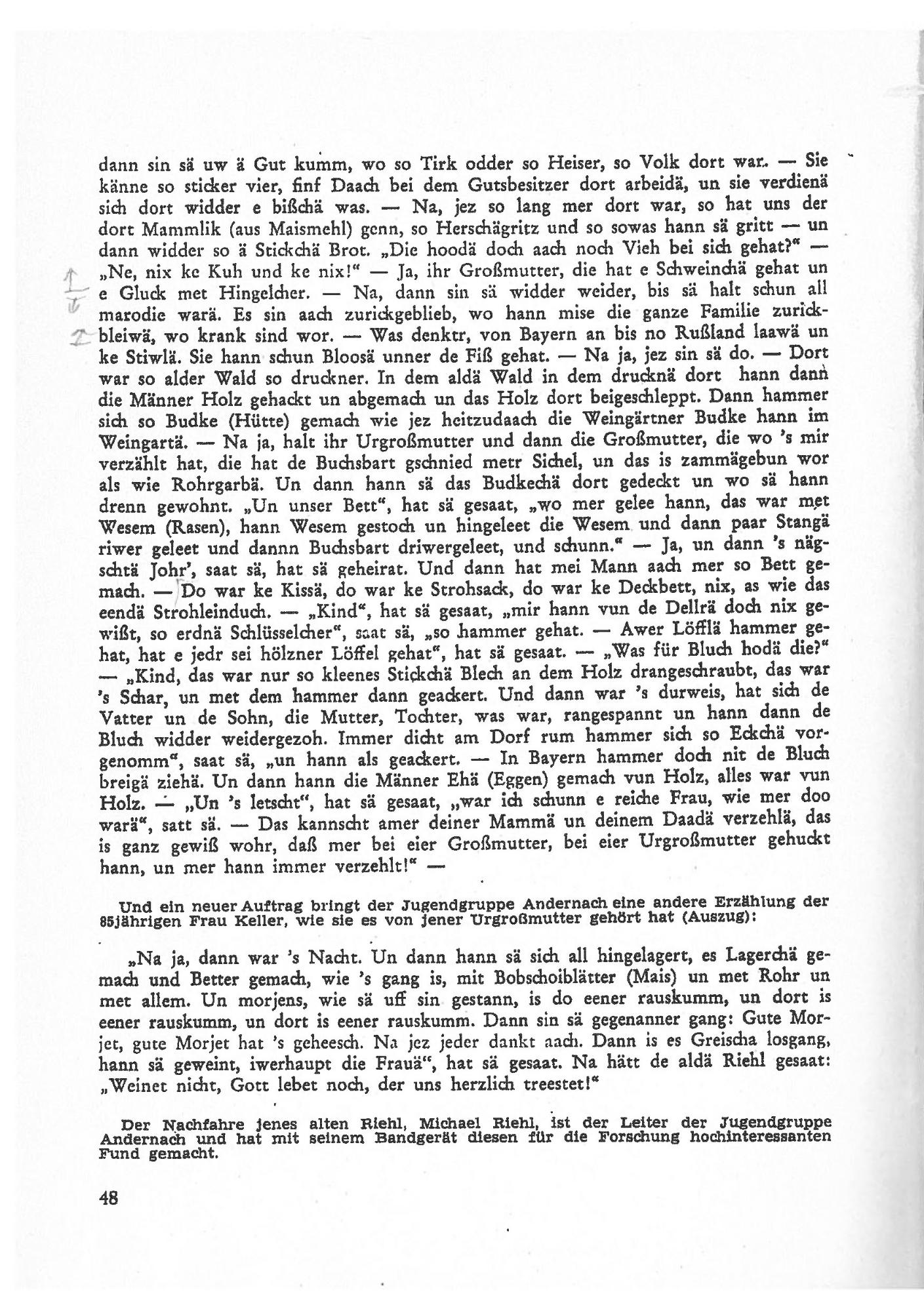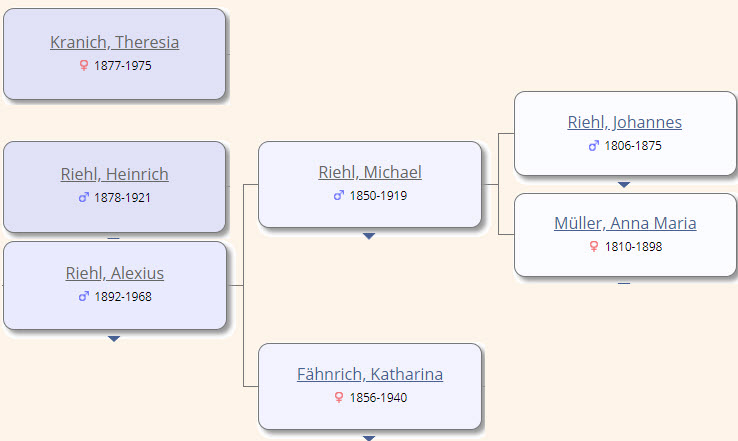

Persons in the report
| ~ 1889 Narrator: |
Anna Maria MÜLLER *1810 † 1898. |
| "im alt Hanriehls Michel sei Mutter" | Anna Maria MÜLLER *1810 † 1898. |
| "der alt Hanriehl" | Johannes Riehl *1806 † 1875. |
| "im alt Hanriehls Michel" | Michael Riehl *1850 † 1919. |
| "der Lexius" | Alexius Riehl *1892 † 1968. |
| Listeners: Theresia Kranich, Jungmagd "de Henrich" |
Theresia Kranich *1877 † 1975. Heinrich Riehl *1878 † 1921. |
| ~ 1962 Narrator: |
Theresia (Kranich) Keller *1877 † 1975. |
| Listeners: | Alois Leinz *1918. Michael Riehl *1939. Theresa wasn't sure if "alt Hanriehls Michel" is the grandfather or the great-grandfather of Michael Riehl *1939. |
Source
|
Der Göttinger Arbeitskreis · Schriftenreihe Heft 66 Salutation "Ihr"Elderly people (persons to be respected) were not addressed with "Du", but with "Ihr". Report of the emigration. In the excerptTranslated from Krasna dialect to English:(What was it like when you immigrated?) Oh, well, that was old Hanriehl's Michel's mother, Lexius's father's mother, it was his grandmother. And I was a maid there with them. And then the old woman was already so old, she didn't always want to sit alone inside, and we weren't allowed to leave. And old Hanriehl's Michel, your grandfather, your great-grandfather, said: "Go over to grandmother's house! Grandma should tell you fairy tales!" - Well, now we went over there (sometimes), and sometimes we liked going in and sometimes we didn't. I'm telling the truth. Now she sometimes sat by the stove, sometimes she sat in bed. - (You weren't allowed to go for a walk in the evening?) We weren't allowed, no, no, Henrich wasn't, and I wasn't either. I did needlework, knitted or crocheted, as it was there. - Well, now we're sitting like this, and suddenly Henrich says: "Well, Grandma, why did you come all the way here? You were in Bavaria, you've already told us, why did you come all the way here?" - "Well," she said, "child, it was so bad to live there, we had so little land and everything was so expensive! Well, that's how we got here." - "So how long did you travel?" I said. "Oh child!" - "How did you travel?" -"Oh child, there was no question of driving! We had to walk all the way here!" she said. "Well, you couldn't stand it, it's long and far, Germany, Bavaria!" - "Yes, we didn't always walk either," she said, "we had to lie in quarantine sometimes for a month or a month and a half or a fortnight - whatever the villages were like. - And we didn't travel in winter," she said, "we had to lie down." - "What did you (did you) eat?" - "Well, they got something to eat; but it was such bad food, the bobschoi flour (cornmeal) was moldy and pressed together that they had to beat it apart. They almost died of hunger! But what could they do, they were on their way, they just had to get through! Now they had to lie there for a while, then heidi (go) on again, the wagon was straightened out again." - "Well, what kind of car did you have? You said you didn't drive?" - "Well, our father made a little cart like this," she says, "with two wheels and a drawbar at the front! And then we put our stuff on it. Then two pulled at the front and the others at the back, the ones at the back pushed." - "Well, where did you put all your things?" - "Everything on the cart!" - "Well," I say, "well, my God, well, where did you put your clothes and everything?" - "Well, child, she said, do you think we had clothes? We only had a Sunday suit and a weekday suit. I had two skirts," she said, "a canvas skirt and a thin skirt," she said, "and in summer I cut off the bodice of the canvas skirt and sewed it to the thin one. And when winter came, when it got cold, I'd cut the bodice off the thin one again and sew it onto the thick skirt. And the men each only had one pair of canvas pants for Sundays and one pair for weekdays. There was nothing of woolen clothes, nothing, just canvas clothes. - Well, they drove a little further and then they came to an estate where there were such Turks or such houses, such people. - They could work for the landowner there for four or five days and earn a bit of money. - Well, as long as we were there, he gave us mammlik (polenta), millet groats and things like that - and then another piece of bread." - "They had livestock with them, didn't they?"-"No, nothing, no cows and no nothing! - Yes, their grandmother, she had a pig and a mother hen with chicks - "Well, then they moved on again until they were marodie (broken). They also stayed behind, and the whole family had to stay behind because they got sick. - What do you think, walking from Bavaria to Russia and no boots. They already had blisters under their feet. - Well, now they're here. - There was such an old forest, so dry. In the old forest, in the dry forest, the men chopped wood and dragged the wood there. Then we made ourselves budke (huts), just like the winegrowers have huts in the vineyard nowadays. - Well, just her (title 'your'?) great-grandmother and then the grandmother, the one who told me, she cut the goat's beard with a sickle and it was tied together like sheaves of cane. And then they covered the little hut there and lived in it. "And our bed," she said, "where we lay, that was covered with washes (grass), they cut the washes and laid them down and then put a few poles over them, and that was it." - "Yes, and then the next year," she says, she got married. "And then my husband made me a bed like that. - There was no pillow, there was no straw sack, there was no comforter, nothing but the one straw sheet." -"Child," she said, "we didn't know anything about the plates, such earthen bowls," she said, "that's what we had. - But we had spoons, we each had our own wooden spoon," she said. - "What kind of plow did they have?" - "Child, it was just a small piece of metal screwed to the wood, that was the share, and we plowed with it. And then the father and son, mother, daughter, whatever it was, would pull the plow along. We always plowed corners close to the village," she says, "and plowed like that. - In Bavaria we didn't have to pull the plow. And then the men made harrows from wood, everything was made from wood." - "And finally," she said, "I was already a rich woman when we were here," she said. - "But you can tell that to your mother and father, it's certainly true that we sat with your grandmother, with your great-grandmother, and we always told stories!" "Well, then it was night. And then they'd all lie down, make their beds and beds, as they did, with bobschoi leaves (corn leaves) and cane and everything. And in the morning, when they got up, someone came out of there, and someone came out of there, and someone came out of there. Then they walked towards each other: Good morning, good morning, they said. Well, now everyone says thank you too. Then the crying started, they cried, the women in general," she said. Well, old Riehl would have said: "Don't cry, God is still alive to comfort us!" Dialect: Krasna(Wie war denn das, wie (als) Ihr eingewandert seid?) Ach, na das war dem alt Hanriehls Michel seine Mutter, dem Lexius seinem Vater seine Mutter, seine Großmutter war's. Und ich war als Magd dort bei ihnen. Und dann die Alte war schon so alt, die Frau, die hat doch so alleine nicht immer wollen hocken drinnen, und wir haben nicht fort gedurft. Und alt Hanriehls Michel, Euer Großvater, Euer Urgroßvater, hat gesagt: "Geht rüber zu der Großmutter rein! Großmutter soll euch Märchen erzählen!" - Na, jetzt sind wir als (manchmal) rüber, und manchmal sind wir gern reingegangen und manchmal auch nicht. Ich sage die Wahrheit. Jetzt hat sie am Ofen manchmal gehockt, manchmal hat sie im Bett gehockt. - (Ihr habt abends nicht dürfen spazierengehen?) Wir haben nicht dürfen,nein, nein, der Henrich nicht, und ich auch nicht. Ich habe Handarbeit gemacht, gestrickt oder gehäkelt, wie's dort war. - Na, jetzt hocken wir so, und auf einmal sagt der Henrich: "Na, Großmutter, warum seid'r (seid ihr) denn bis hier hergekommen? Ihr ward doch in Bayern, habt'r (habt Ihr) schon erzählt, warum seid'r (seid ihr) denn bis hier hergekommen?" - "Na", hat sie gesagt, "Kind, 's war doch dort so schlecht zu leben, wir hatten so wenig Land gehabt, und 's war so teuer alles! Na, so sind wir hier her." - "Na wie lange seid'r (seid ihr) dann gereist?" hab ich gesagt. "Oh Kind!" - "Wie seid'r (seid ihr) denn gefahren?" -"Oh Kind, vom Fahren war keine Rede! Wir haben müssen laufen zu Fuß bis hier her!", hat sie gesagt. "Na, das habt'r (habt ihr) doch nicht ausgehalten, das ist lang, weit, das Deutschland, das Bayern!" - "Ja wir sind auch nicht immer gelaufen", hat sie gesagt, "wir haben müssen in Quarantäne liegen manchmal einen Monat oder anderthalb Monate oder vierzehn Tage - immer so, wie die Dörfchen waren. - Und in Winterszeit sind wir ja nicht", sagt sie, "gereist, haben wir müssen liegen." - "Was habt'r (habt ihr) denn gegessen?" - "Na, sie haben zu essen gekriegt etwas; aber 's war so schlechtes Essen, das Bobschoimehl ( Maismehl) war zusammengeschimmelt und zusammengedrückt, dass sie haben 's müssen auseinanderklopfen. Sie sind vor Hunger beinahe gestorben! Na, was sollten sie aber machen, sie waren auf dem Weg, sie haben halt müssen durch! Jetzt haben sie eine Zeit lang dort müssen liegen, dann heidi (los) wieder weiter, ist der Wagen wieder gerichtet worden." - "Na, was für einen Wagen hattet denn ihr? Ihr habt doch gesagt, ihr seid nicht gefahren?" - "Na, unser Vater hat so ein Wägelchen gemacht", sagt sie, "so mit zwei Rädern und vorne Deichselchen rangemacht! Und dann haben wir unser Sach draufgetan. Dann haben vorne zwei gezogen, und die anderen hinten, die Hintersten haben gedrückt." - "Na , wo hat'r (habt ihr) denn eure Sachen alles gehabt?" - "Na alles auf'm Wägelchen!" - "Na", sage ich, "na, mein Gott, na, wo habt ihr denn eure Kleider und alles hingetan?" - "Na, Kind, hat sie gesagt, meinst du, wir haben Kleider gehabt? 's hat nur jeder ein Sonntagsanzug gehabt und ein Werktagsanzug. Ich habe zwei Röcke gehabt", hat sie gesagt, "ein Leinwandssrock und ein dünner Rock", hat sie gesagt, "und im Sommer habe ich am Leinwandsrock 's Leibchen abgetrennt und hab's an das dünne rangenäht. Und wenn der Winter rangekommen ist, wenn's kalt geworden ist, habe ich am dünnen wieder 's Leibchen abgetrennt und hab's an den dicken Rock angenäht. Und die Männer hat jeder nur ein Paar Leinwandshosen für sonntags gehabt und ein Paar für werktags. Da war von wollenen wie nix, nix, bloß Leinwandskleider. - Na, sind sie wieder ein Stück gefahren, und dann sind sie auf ein Gut gekommen, wo solche Türken oder solche Häuser, so Volk dort war. - Sie könnten so Stück vier, fünf Tage bei dem Gutsbesitzer dort arbeiten, und sie verdienen sich dort wieder ein bisschen was. - Na, jetzt so lang wir dort waren, so hat uns der dort Mammlik (Polenta) gegeben, so Hirsegrütze und so etwas haben sie gekriegt - und dann wieder so ein Stückchen Brot." - "Die hatten doch auch noch Vieh bei sich gehabt?"-"Nein, nichts, keine Kuh und kein nichts! - Ja, ihre Großmutter, die hat ein Schweinchen gehabt und ein Glucke mit Küken - "Na, dann sind sie wieder weiter, bis sie halt schon marodie (kaputt) waren. Es sind auch "Na ja, dann war's Nacht. Und dann haben sie sich alle hingelagert, das Lagerchen gemacht und Betten gemacht, wie's gegangen ist, mit Bobschoiblätter (Maisblätter) und mit Rohr und mit allem. Und morgends, wie (als) sie auf sind gestanden, ist dort einer rausgekommen, und dort ist einer rausgekommen, und dort ist einer rausgekommen. Dann sind sie aufeinander zugegangen: Guten Morgen, guten Morgen hat's geheißen. Na, jetzt jeder dankt auch. Dann ist das Geheule losgegangen, haben sie geweint, überhaupt die Frauen", hat sie gesagt. Na, hätte der alte Riehl gesagt: "Weinet nicht, Gott lebet noch, der uns herzlich tröstet!" Transcript: Gisela Schaal |
